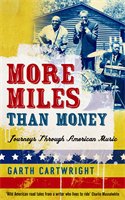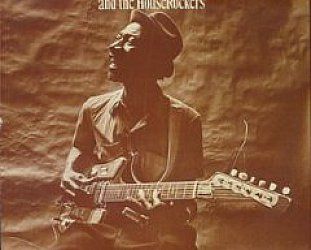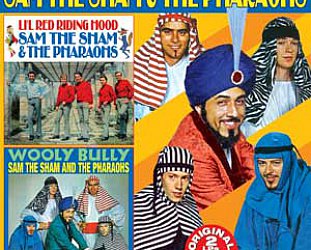Graham Reid | | 3 min read
Hound Dog Taylor and the Houserockers: She's Gone

Writing about music is a sedentary affair today: CDs are reviewed at home, and artists are interviewed by phone, in a comfortable hotel or their record company office. Latterly, to my regret, it has been like that for me -- but not so for Cartwright whose previous book Princes Amongst Men saw him on the road in some bad and strange parts of Eastern Europe on the trail of various gypsy musicians.
That account was a remarkable insight into that world and if sometimes Cartwright's self-styled outsider persona intruded on the narrative it was forgiveable for the information and earthiness he brought to light.
Doubtless there will be similar criticisms of this Kerouac-framed journey through various parts of the USA to locate the burning heart of what we might call "real" music, that which came and comes from the hearts of people and cultures rather than the boardrooms and recording studios of LA, NYC or wherever.
London-based Cartwright takes to the road -- by Greyhound and battered rental -- to traverse the old routes and into parts of the US where few music writers dare to venture or would even bother with.
The story gets off to a clunking start however when he gets holed up at the Burning Man Festival which offers few insights other than as a counterpoint to what follows. And if he did hunker down at that particular circus with his copy of Mark Twain is moot: if he did he was a very different kind of attendee, if not then it is a conceit of the author.
Either way, once that and some rather obvious observations about the crassness of Las Vegas are out of the way (I quite like the place, his higher purpose however was to meet the hard working Jimmy Castor) this narrative really takes off.
Cartwright is a bluntly opinionated writer who runs contrary to most prevailing critical thought (he prefers the purity of the Beach Boys' I Get Around to the more acclaimed Brian Wilson work on Smile, etc) but this makes for provocative reading and will test a few prejudices of your own. It did me.
But it is when he is in the barrio or seedy clubs, hanging out with a taciturn Howe Gelb, the enlightening Mabel John, and shining a light on East LA and the Hispanic music (from cantina pop to gangsta rap) which comes from it that this journey becomes gripping. And real.
From the Navajo rez to Clarksdale in Mississippi, Cartwright rolls in (seemingly fearless although there are hints of unease throughout) and looks up the lost names and great musicians of American regional music. He brings poetry, history, contemporary culture and race into the mix also.
More Miles Than Money is, incidentally, a users guide to some of these artists and styles and because he is so assured in his opinion you will be highlighting album titles and artists and heading to the internet to track many of them down. Who knew that Sam the Sham (of Woolly Bully and Little Red Riding Hood fame in the Sixties) had such an interesting career? Cartwright actually.
He offers potted histories of many musicians, lets fly with some Kerouac-styled prose or references to link the miles and roads travelled, and hooks up with Bruce Iglauer of Alligator Records for an insight into Chicago blues and characters like the late Hound Dog Taylor.
The blues is well served: his encounter with Mathew Johnson of the Fat Possum label ("very much the polite, middle-class Southerner") which recorded Junior Kimbrough, RL Burnside, T-Model Ford and others is illuminating.
"I know a lot of people think I'm an asshole," says Johnson, "for marketing the blues as rough music -- BB King's always saying, 'I hate it that people think because I play the blues I beat my wife' -- but, and I'm sorry BB, our guys are pretty crazy people!"
Johnson also speaks for what drove Cartwright on this quest when he says, "The sense of humour has been taken out of this country. Look, when I was a kid people who rode Harley Davidsons were bad, scummy people. Now they're the Republican's favourite form of tranbsport.
"All the eccentric things have been cleaned up -- Iggy's heroin songs are used to advertise banks. Ray Charles and Al Green are played to death as lifestyle muzak. Someone like Ol' Diry Bastard, now, he was a genius, but there's hardly anyone like him in popular muusic anymore.
"Did you see the Scorsese Blues [television] series? Wasn't that the sorriest piece of shit? It just told viewers that blues was boring."
In Cartwright's hands the blues and Mexican music -- or even doo-wop -- are never boring. He brings groups like the largely forgotten Dells into the spotlight and makes their story thrilling.
For many, Cartwright's freewheeling, heavily referencing style (music lyrics, Kerouac, punctuating one-liners) will be an irritant -- but the bigger story is also here and is told in the wide sweep and the details alike.
And say what you will, he got out of the office and onto the road.
This is music writing like it used to be. Opinionated, passionate, informed, real, and about the music makers and the stories behind them.
Not a PR person in sight.






Stuart H - Jan 12, 2010
Got this for xmas and greatly enjoyed it. As you say Garth faltered a bit at start with Burning Man fest - which didn't belong to this story anyway - but then got into his stride. I'm inspired to seek out some recordings and to read his earlier book on the Gypsy trail also.
SaveLee - Feb 16, 2010
I was lucky enough to have won this book from this website, and loved the ride I was taken on from beginning to end with Garth Cartwright's trek across America. If you enjoy reading about musicians that are not part of the mass produced 'McMusic' that we seem to be saturated with, I thoroughly recommend this book. And its one of the best travel books I have read since The Idiot Boy Who Flew! But watch out, as Graham told me, your itunes account definately takes a hammering finding the all the albums recommending in this book.
Savepost a comment